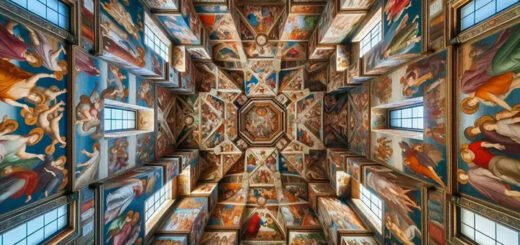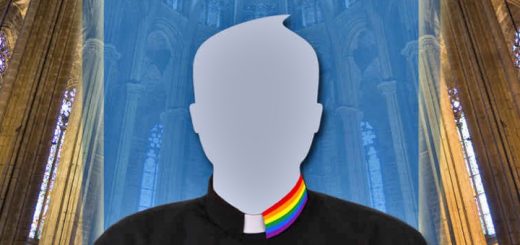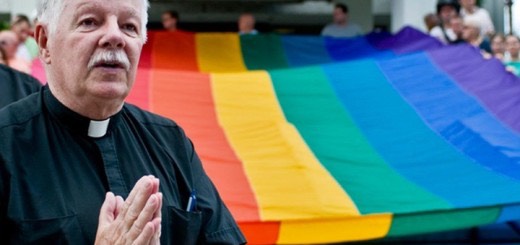Live in hiding. Be gay priests in the Catholic Church
Article by Josselin Tricou* Published in the magazine Sociologies (France), 2018/2 (vol. 9), pp. 131-150, freely translated by Giacomo Tessaro, part two
In 2011, while I work for a Catholic organization, I encounter Father Adrien, a diocesan priest little more than forty years old, parish priest of a bourgeois urban parish. Since the posture of the body you can see how far and detached it is, and from the surname it is learned that it is of noble origin: her family comes from the ancient rural nobility of theAncien Régime. Has grown in the so -called scouting movement "traditional" or "Unitary" (Guides et Scouts of Europe, Scouts Unitaires de France), created between the 60s and 70s as a reaction to the pedagogical reforms within the Scouts of France. He dresses the talare in his parish, in all other places, however, clerical jacket and shirt and collar [1]. Celebrates mass with a scrupulous respect for the columns [2]. His homilies are rigidly moralistic and "restorational" in ecclesiological terms, that is to say that they try to revive the dream of a Christian society.
In 2012, in the middle of the debates on the opening of civil marriage to homosexual couples, known in France as "Mariage Pour Tous", I phone a friend of mine, Father Marc, a priest of just over forty years who has experienced what is called "late vocation". He is a "progressive", and he confides to me his sexuality and uncomfortable in the face of what he considers a return of homophobic rhetoric within the Church. While having never made a public coming out, post articles on the subject on Facebook, critics towards the virulence of the Church. He tells me that he dined with Father Adrien, who launched himself into a homophobic controversy against homosexual marriage; Father Marc is still below shock.
In 2013 I was writing my thesis in Political Science on "Identity of men in the Church", and for my sociological research, he interviewed Father Julien, a monk of just over fifty years old, which I had met a few years earlier, when I was having a retreat in his monastery, where he had discreetly flirt with me. Interpreting [3], at least in front of me, the part of the checca (that is to say "The popular archetype of the effeminate man characterized by the double stigma of the reversal and extravagance", as Jean-Yves the Talec writes), and having fun calling his confreres with female pronouns, according to the tradition of humor "Camp", speaks to me (with a certain irritation) of the many homosexual priests who knew: “In particular, the diocesan clergy lives on lies, deceptions, and are paranoid [frightens] to death. They tell me 'you have to be discreet in public, and never tell things as they are!'. No! Things you have to tell them! You can't turn in talare and protest against homosexuals, and then immediately go to sc ... er, no, to have sex, uh no ... homosexual ... homosexual, sexual intercourse? [Laughs] Freudian Lapsus! ".
More than a real tongue, this seems to me to be an example of the classic linguistic tricks that serve to keep the hiding place closed, which consists in eterosexualize, or at least in neutralizing, the words used to talk about sexuality. Father Julien (probably) laughs because he knows very well to use the same language he condemns, rightly and vehemence, in his colleagues, but continues, and cites the example of Father Adrien, knowing well that I also know him: “I don't judge him, I know him like my pockets and I like it very much, but the terrible thing is that every time we are in public he says to me 'behave well! Behave well! ' , but I don't need to behave well! And his great question is 'you think they believe I am gay?' ".
According to Father Julien, Father Adrien (who a vote asked him for help for "Unify his life as a priest" After discovering that he was sexually attracted by men) he took refuge in a double life very early, divided between the "Pure love" For the Church and a promiscuous homosexuality that consists of anonymous relationships. It is a temporally and spatially divided life, according to Father Julien a case "To cure during the day and drag queen at night" and "At his house there is the bedroom with his computer, and the rest of the house; You cannot enter the room, it is locked ".
First of all, we must note that Father Julien's words can be excessively critical as it is a monk, moreover a member of an ancient and prestigious order, but in any case, from the point of view of the objective structures of the Catholic Church, the monastic clergy ( o regular) enjoys greater independence from the ecclesiastical authority (local or Roman) of the diocesan (or secular) clergy. Their "deviant" members, protected by the community, are less directly exposed to the risk of being "hard" judged, i.e. the possibility of receiving insults or complaints from the laity. Therefore, continuing in the spirit from flirtation Of our first meeting, Father Julien plays on our tacit agreement and perhaps tries to impress me with his freedom of speech, in contrast with that of the priests he speaks of.
______
[1] There are two forms of clerical dress that officially distinguish the priests from the laity in daily life (i.e. when they do not offer): one is the talare, and the other is a black jacket with a "Roman" shirt and collar, So called because it resembles that of Roman tale. Between the 70s and 80s the tendency between the clergy to avoid clericalism was strong: the result is that the great majority of the French priests and bishops has abandoned any type of dress that marks it, but today the clerical complete of Jacket and shirt appears "normal" among the younger members of the clergy. Talare survives as a mark of traditionalism, becoming in any case more and more common.
[2] In the Catholic liturgical texts the rubrics These are those sections that are not part of the rite, but indicate how the same should be performed.
[3] Following Foucault, Judith Butler considers the performance of gender not an act of the subject, but a repetitive process of imitation of the conventions, "interpreted" by the subject, repetition that has the effect of building and creating the subject, who is still able to play with his performance Depending on what is proposed, as in this case Father Julien does.
* Josselin Tricou is assistant to the Laboratory of Gender Studies and Sexuality (Legs) at the Paris 8 University.
Original text: Recreating "Moles": Managing Homosexual Priests' Silence in an era of gay marriage






